Understanding emotional intelligence in toddlers is crucial as it shapes their social skills and emotional regulation. From ages one to three, kids identify basic emotions like happiness and sadness. As they grow, observe how they mimic facial expressions and engage in social referencing. Parental guidance and secure attachment play essential roles in their emotional development. Teaching emotional vocabulary and modeling healthy expression can greatly enhance their abilities. Discover more about nurturing emotional intelligence in young children.
Key Takeaways
- Emotional intelligence in toddlers involves recognizing and managing basic emotions like happiness and sadness, starting as early as age one.
- Early signs of emotional intelligence include crying, facial expressions, and social referencing, which develop between four months and two years.
- Secure attachment and authoritative parenting promote positive emotional development and adaptive emotional regulation in young children.
- Teaching emotional vocabulary and modeling healthy emotional expression are effective strategies for enhancing toddlers’ emotional intelligence.
- High emotional intelligence supports better relationships, improved academic performance, and effective emotional management, leading to overall mental well-being.
Understanding Emotional Intelligence in Toddlers
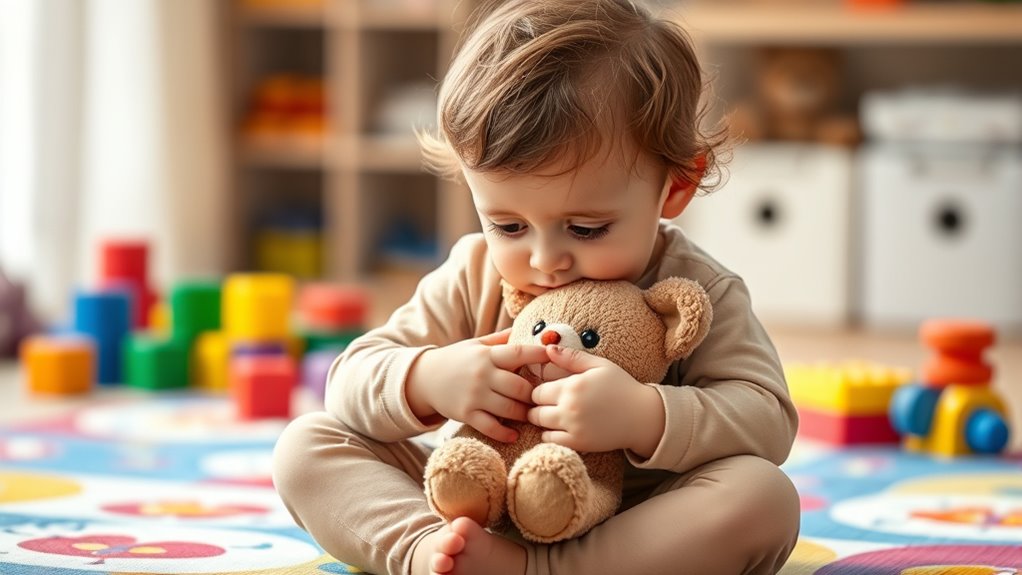
Emotional intelligence involves recognizing, understanding, and managing both their emotions and those of others. This skill influences their social interactions and academic success throughout life. Toddlers between ages one and three begin to show signs of emotional awareness, identifying basic feelings like happiness and sadness. As they grow, emotional regulation develops, especially through caregiver modeling. Sleep training methods can also benefit toddlers by promoting a sense of routine and security, which is essential for emotional development. Additionally, the classy way to explain a breakup can demonstrate to toddlers how to communicate feelings effectively when faced with conflicts. Engaging with educational toys allows toddlers to practice emotional skills through role-playing scenarios, enhancing their emotional intelligence. Newborns often require holding to fall asleep, illustrating the importance of environmental interactions in shaping emotional growth.
When caregivers provide support and validation, toddlers learn to express their emotions appropriately and resolve conflicts constructively. Fostering emotional intelligence in these early years sets the stage for better communication skills and resilience, ultimately predicting future success in personal and professional relationships. Additionally, self-awareness in toddlers can enhance their ability to navigate social situations effectively.
Early Signs of Emotional Intelligence
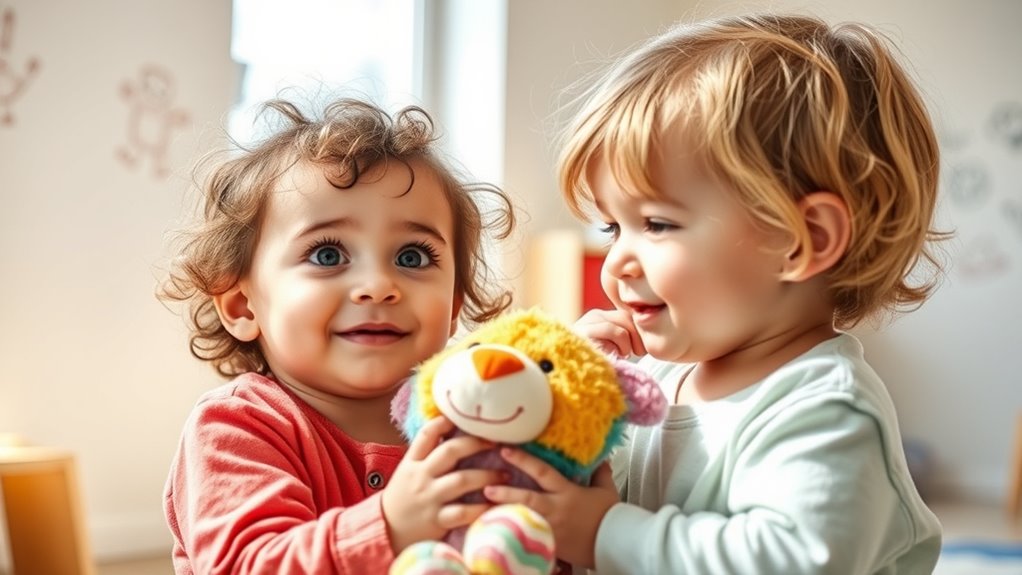
As toddlers navigate their early years, you’ll notice several early signs of emotional intelligence emerging. Crying, for instance, shows they’re beginning to express emotions and feel safe doing so. Necessary Cookies are essential for basic site functionalities, just as emotional expression is vital for toddlers’ development.
Around four months, they develop facial expressions and start recognizing emotions through mimicry. By seven months, they begin social referencing, observing how others react emotionally. Audiometric Testing can be crucial in understanding how children communicate their feelings, as it highlights the importance of clear auditory signals in emotional development. Engaging in Turkey Bean and Tomato Zoodle Bowl meals can also help promote healthy habits and emotional well-being as they learn about food and nutrition. Understanding the concept of emotional regulation can further enhance their ability to manage their feelings effectively.
By four months, toddlers express emotions through facial expressions and mimicry, while at seven months, they start observing emotional reactions from others.
You might also see them labeling basic emotions like happiness or sadness, which enhances their emotional awareness. Empathy emerges around their second year, as they recognize others’ feelings and may offer comfort to those who seem upset.
Additionally, their curiosity drives them to explore and ask questions, further developing their emotional intelligence and engagement with the world around them. A holistic approach to emotional development can support their growth and well-being as they learn to navigate their feelings.
Parental Influence on Emotional Development

The early signs of emotional intelligence in toddlers are markedly shaped by their parents’ influence and interactions. Secure attachment provides a safe base for your child to explore emotions and develop regulation strategies.
When you coregulate emotions within a secure relationship, your child learns adaptive emotional strategies. Authoritative parenting, which validates and teaches emotional awareness, fosters positive emotional development. Additionally, regular health screenings can help parents identify any potential emotional challenges early on, ensuring timely support for their child’s development. Furthermore, understanding the impact of brain fog can help parents recognize when their child may be experiencing moments of confusion or lack of focus. In contrast, emotionally abusive practices can lead to feelings of invalidation and increased anxiety. A supportive emotional climate at home enhances healthy emotional development, while negative environments can contribute to maladaptive regulation. Additionally, seeking professional counseling can provide valuable support for both parents and children during challenging times. Recognizing narcissistic behaviors in interactions can also help parents create a more nurturing environment for emotional growth.
Teaching Strategies to Enhance Emotional Intelligence

Enhancing emotional intelligence in toddlers involves several effective strategies that parents and caregivers can easily implement.
Start by teaching emotional vocabulary, helping your child label their feelings. Use visual aids like books and songs to illustrate different emotions, making recognition easier. Encourage your child to express emotions using simple words like “happy” or “sad.” Incorporating educational toys that promote emotional exploration can also support this learning process. Additionally, understanding emotional dysregulation can help caregivers teach toddlers how to navigate their feelings more effectively. Creating a space that is both safe and stimulating is essential for toddlers to explore their emotions and develop a better senior living experience in the future. Engaging in brain-boosting activities can also help toddlers enhance their emotional awareness through playful learning.
Teaching toddlers emotional vocabulary and using visual aids can help them recognize and express their feelings effectively.
Model healthy emotional expression by communicating your feelings calmly and validating their emotions. Engage in role-playing to help them understand others’ feelings and encourage acts of kindness.
Provide opportunities for problem-solving through group activities and decision-making. Finally, create a nurturing environment where your child feels safe to explore and express their emotions, fostering emotional awareness and resilience. Additionally, shared experiences can further enhance their emotional development and help them build strong relationships.
Benefits of High Emotional Intelligence
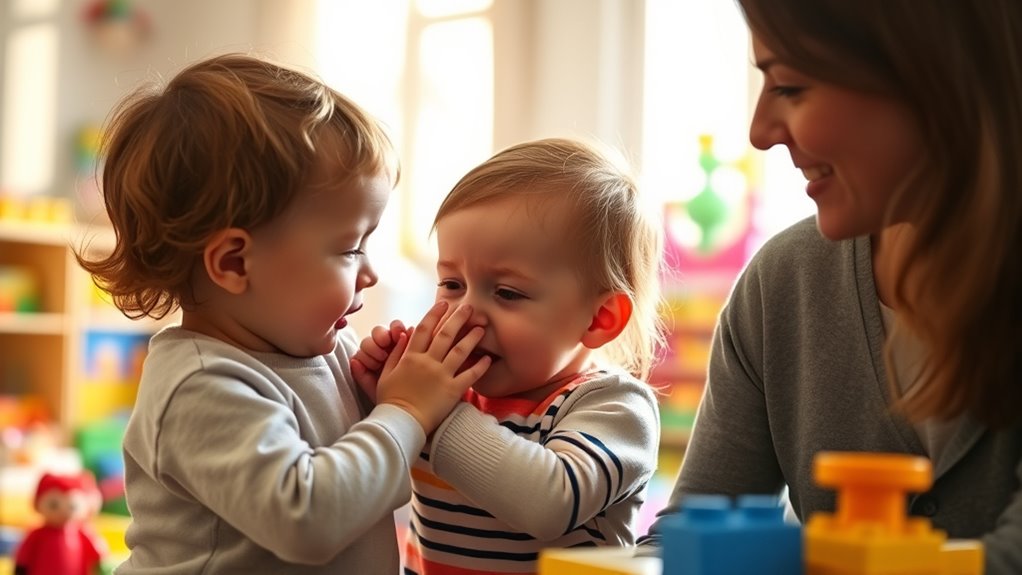
High emotional intelligence offers numerous advantages that can greatly impact a child’s development and future.
When your child understands their emotions and those of others, they’ll build better relationships with peers and adults. This skill enhances social interactions, making it easier for them to resolve conflicts and collaborate effectively.
You’ll also notice improved academic performance; emotionally intelligent children are more focused, engaged, and adept problem-solvers. Their mental well-being benefits too, as they experience lower anxiety and express emotions healthily. Additionally, developing a growth mindset can further enhance their ability to tackle challenges and setbacks.
Furthermore, high emotional intelligence fosters resilience, helping them cope with setbacks and view challenges positively. By nurturing this skill, you can utilize accountability partners who encourage emotional growth, ultimately laying a strong foundation for your child’s future success in both personal and professional domains.
Role of Educational Settings in Emotional Development
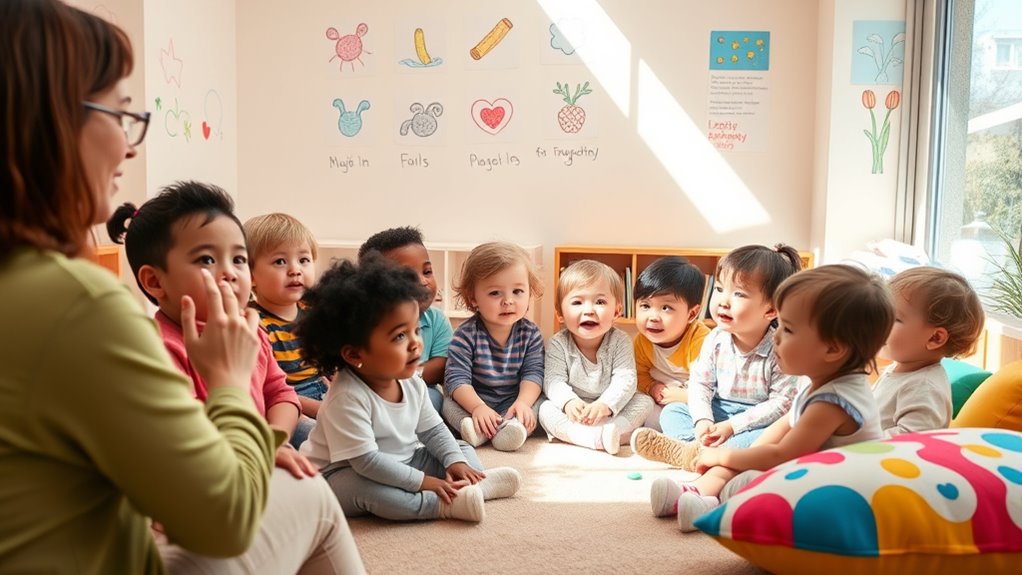
While parents play an essential role in emotional development, educational settings considerably shape how children understand and manage their feelings.
Schools incorporate structured learning activities and Social and Emotional Learning (SEL) programs that teach children to empathize and regulate emotions. Your child’s teacher interacts with them in supportive ways, modeling positive behavior and creating a safe environment for emotional expression.
Through guided discussions and stories, children learn to identify and manage their feelings, fostering self-awareness. Effective emotional development in schools can boost academic performance, enhance social relationships, and reduce behavioral issues.
Fostering Emotional Intelligence Through Play and Interaction
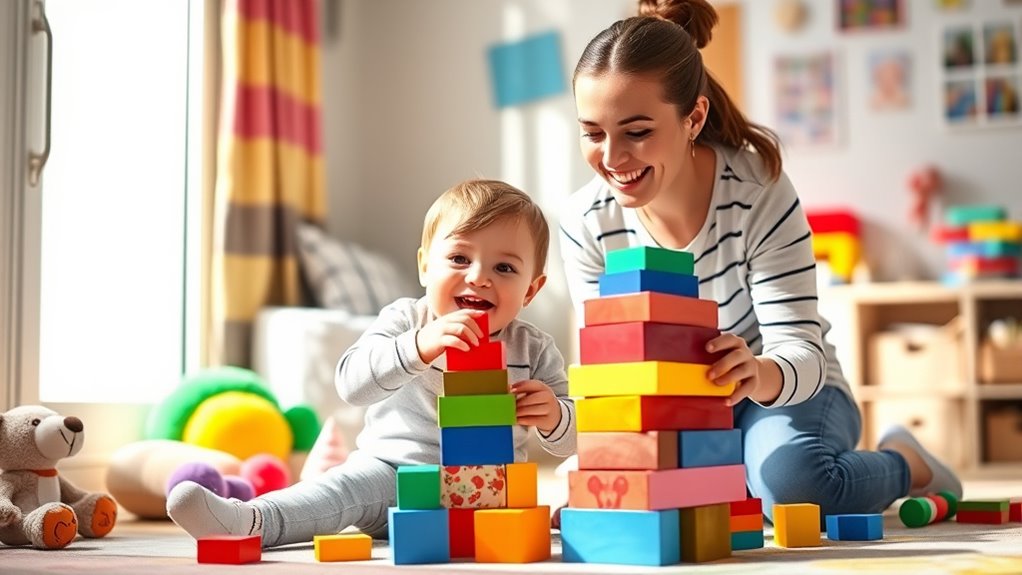
Educational settings play an essential role in shaping emotional development, but the journey continues through play and interaction at home and in social settings. Engaging in play allows your toddler to express emotions freely, acting out various scenarios without real-life consequences.
Educational environments are crucial for emotional growth, but play at home further enhances this development through creative expression and social interaction.
This creative exploration fosters empathy as they step into different roles, helping them understand others’ feelings. Unstructured play promotes significant social skills, like sharing and negotiation.
To support emotional expression, label feelings and encourage your child to express emotions through words or art. Model emotional regulation by demonstrating calm behavior and using techniques like deep breathing.
Regular conversations about emotions will deepen their understanding and help them navigate their feelings more effectively.
Frequently Asked Questions
How Can I Tell if My Toddler Is Emotionally Intelligent?
You can tell if your toddler is emotionally intelligent by observing their ability to recognize and express feelings.
If they label emotions, show empathy towards others, and adapt to different social situations, that’s a good sign.
Pay attention to how they communicate their feelings and whether they seek to understand others’ emotions.
If they’re curious and ask questions about feelings, they’re likely developing a strong emotional awareness.
Are There Specific Books to Teach Emotional Intelligence to Toddlers?
Oh sure, just hand your toddler a philosophy book and watch them ponder life’s complexities!
But seriously, you can introduce emotional intelligence through fun books. Titles like *The Feelings Book* and *Glad Monster, Sad Monster* make emotions relatable and engaging.
They’re colorful and playful, sparking conversations about feelings. By reading these together, you’re not just entertaining them; you’re also helping them understand and express their emotions in a safe, delightful way.
What Age Is Best to Start Teaching Emotional Intelligence?
You can start teaching emotional intelligence as early as infancy.
By the time your child reaches toddlerhood, they’re ready to learn about emotions. At around age 2, they begin recognizing feelings in themselves and others.
You should engage in conversations about emotions and encourage expression through play or art. The earlier you introduce these concepts, the better equipped they’ll be to navigate their feelings and develop empathy throughout their life.
Can Emotional Intelligence Be Measured in Toddlers?
Measuring emotional intelligence in toddlers can be as tricky as catching smoke with your bare hands. While formal assessments exist, like the Emotional Intelligence Scale, they often struggle with younger children’s unique ways of expressing feelings.
You can observe your toddler’s interactions and responses to gauge emotional awareness. Engaging them with tools like mood meters helps expand their emotional vocabulary, making it easier to understand and measure their emotional development.
How Do Cultural Differences Affect Emotional Intelligence Development?
Cultural differences greatly affect emotional intelligence development by shaping how you express and manage emotions.
In Western cultures, you might feel encouraged to show a wide range of emotions, while in Eastern cultures, you may prioritize group harmony and restraint.
These cultural norms influence your interactions with others and how you learn to label and understand emotions, ultimately impacting your emotional competence and future social relationships.
Understanding these differences is essential for fostering emotional growth.
Conclusion
In nurturing your toddler’s emotional intelligence, you’re planting seeds for a brighter future. As you guide them through the ups and downs of their feelings, you’re not just helping them navigate life’s little storms; you’re helping them flourish amidst life’s challenges. Remember, every moment spent fostering their emotional growth is a precious investment in their happiness and resilience. Together, you’re crafting a beautiful tapestry of understanding, empathy, and connection that will last a lifetime.









